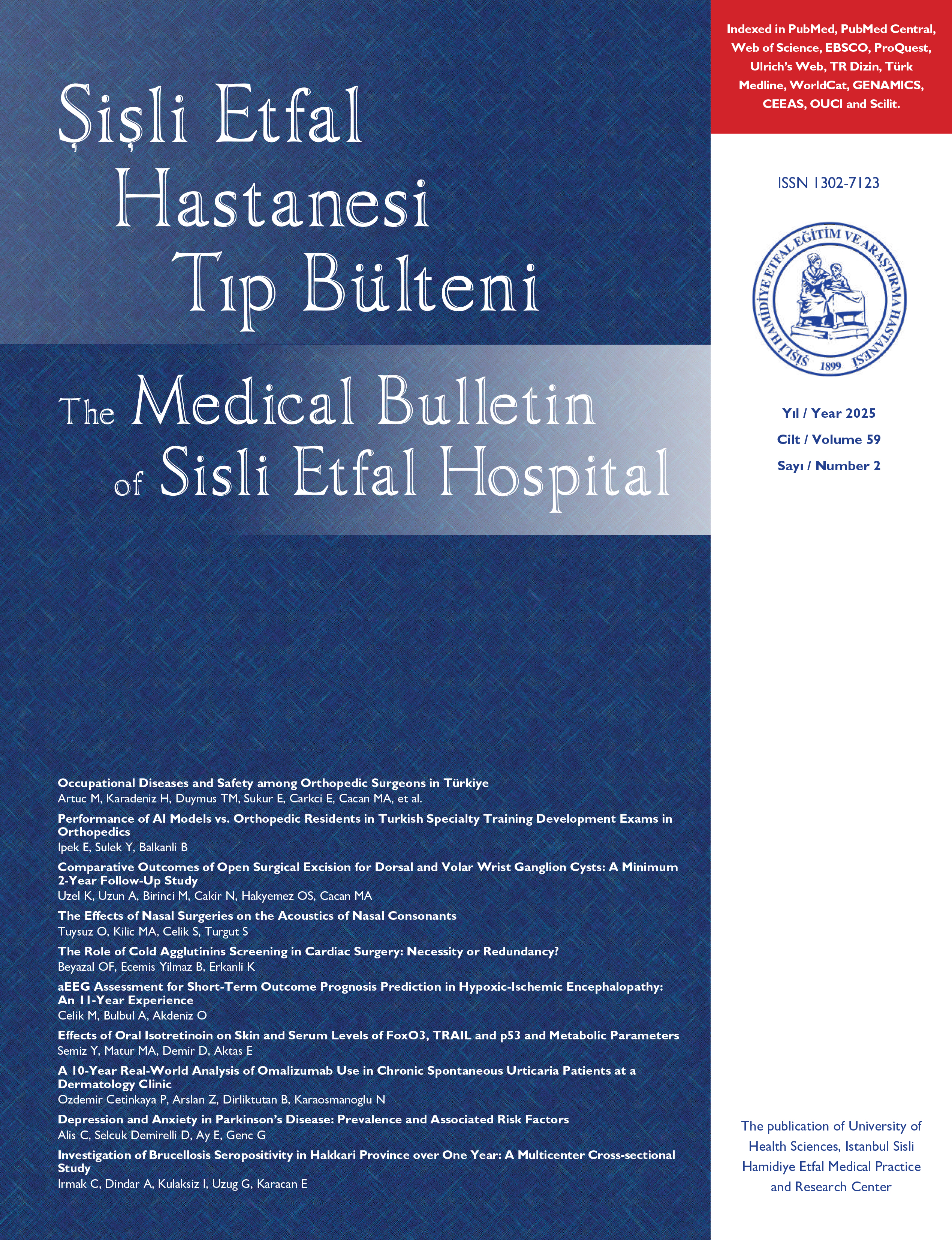
Geriyatrik hemiplejik olgularda depresyon ve anksiyete düzeyi
Ali Yavuz Karahan1, Ercan Kaydok21Konya Beyhekim Devlet Hastanesi, Fiziksel Tıp ve Rehabilitasyon Bölümü, Konya2Niğde Devlet Hastanesi, Fiziksel Tıp ve Rehabilitasyon Bölümü, Niğde
Giriş: İnme sonrasında gelişen depresyon %20-60 oranında bildirilmektedir ancak patogenezi henüz netlik kazanmamış konulardan birisidir. Çalışmamızda inmeli olgularda depresyon ve anksiyete düzeyini ortaya koymayı ve yaş faktörünün tabloya etkisini incelemeyi amaçladık.
Hastalar ve Yöntem: Seksen üç inme hastasının tanımlayıcı özellikleri kaydedildi. Hastaların bağımlılık düzeyi Fonksiyonel Bağımsızlık Ölçeği (FBÖ) ile, depresyon düzeyi Beck Depresyon Ölçeği (BDÖ) ile, anksiyete düzeyi Beck Anksiyete Ölçeği (BAÖ) ile değerlendirildi. Kognitif fonksiyonları değerlendirme amacıyla Mini Mental Test (MMT) kullanıldı. Elde edilen verilere yaşın etkisini ortaya koyabilmek için hastalar 65 yaş ve üzeri geriyatrik (GER) grup ve 65 yaş altı geriyatrik olmayan (NGER) grup olmak üzere ikiye ayrılarak istatistiksel karşılaştırmalar yapıldı.
Bulgular; GER grubunda 16sı kadın (%36,4), 28i erkek (%63,6) olmak üzere toplam 44 hasta, NGER grubunda 18i kadın (%46,2), 21i erkek (%53,8) olmak üzere toplam 39 hasta değerlendirildi. Yaş ortalaması GER grubunda 70,3±6,1, NGER grubunda 55,6±6,4 idi. GER grubunda ortalama FBÖ 65,8±22,5, NGER grubunda ise 77,8±22,1 idi. GER grubunda %20,5 (9) hafif, %47,7 (21) orta, %2,3 (1) şiddetli düzeyde depresyon izlendi. NGER grubunda ise %30,8 (12) hafif, %30,8 (12) orta düzeyde depresyon bulguları izlendi. Gruplar arası karşılaştırmada geriyatrik grubun fonksiyonel bağımsızlık ve kognitif fonksiyon düzeyleri daha geride bulunurken daha ciddi düzeyde depresyon ve anksiyete bulguları gösterdiği izlendi.
Sonuç: İnme sonrası gelişen depresyon yaşam kalitesini ve rehabilitasyon sürecini olumsuz yönde etkileyebilecek sıklığı hiç de az olmayan önemli bir komorbid hastalıktır. Özellikle geriyatrik hastalarda sıklığının daha da fazla olabileceği akılda tutulmalıdır ve erken dönemde tanımlanarak tedavisine başlanmalıdır.
Depression and anxiety levels in geriatric patients with hemiplegia
Ali Yavuz Karahan1, Ercan Kaydok21Depatment of Physical Therapy and Rehabilitation, Konya Beyhekim State Hospital, Konya, Turkey2Department of Physical Medicine and Rehabilitation, Niğde State Hospital, Niğde, Turkey
Introduction: Post stroke depression is the one of the issues not yet well established on pathogenesis and reported 20-60% after stroke. We aimed to reveal the level of anxiety and depression in stroke patients and aimed to investigate the effect of the age factor table in our study.
Patients and Method: Descriptive characteristics of eighty-three stroke patients were recorded. The patients were evaluate with the Functional Independence Measure (FIM) for level of dependency, the Beck Depression Inventory (BDI) for the depression levels, the Beck Anxiety Inventory (BAI) for the anxiety levels, the Mini Mental Test (MMT) for evaluate the cognitive functions. To elucidate the effect of age, patients were divided two groups as geriatric group (GER) and non- geriatric group (NGER) and then statistical comparisons were done.
Results: Sixteen women (36.4%) and 28 men (63.6%) for a total of 44 patients in were evaluated GER group, 18 women (46.2%) and 21 males (53,8%) for a total of 39 patients were evaluated in NGER group. The mean age of GER group was 70.3±6.1 and NGER group was 55.6±6.4. The mean FIM of GER group was 65.8±22.5 and NGER group was 77.8±22.1. In GER group 20.5% mild, 47.7% moderate and 2.3% severe depression was observed. In NGER group 30.8% mild and 30.8% moderate depression was observed. Significantly lower levels of functional independence and cognitive function were observed and depression and anxiety were more serious levels in geriatric patients.
Conclusion: The process of post-stroke depression is not an uncommon comorbid disease which may adversely affect the quality of life and rehabilitation. That should be kept in mind especially in geriatric patients and early treatment should be initiated.
Makale Dili: Türkçe



















